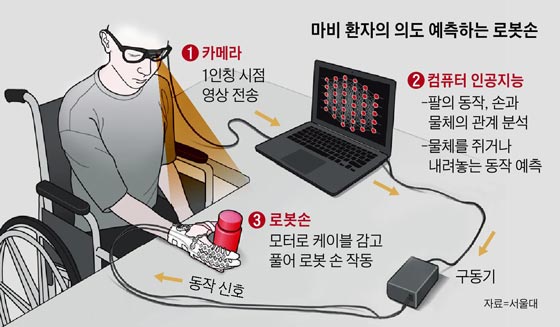Department News
[The Chosun Ilbo] Prof. Kyu-Jin Cho “Robot Arm Helps Patients With Hand Paralysis”
[IF] Robot Arm Helps Patients With Hand Paralysis<?xml:namespace prefix = "o" ns = "urn:schemas-microsoft-com:office:office" />
AI Analyzes Video from Patient’s POV, Predicting Movements; Robot Arm Follows
A research team succeeded in moving a robot arm according to how paralytic patients wish. If this technology is fully developed, patients with hand paralysis will be able to perform daily tasks on their own.
Soft Robotics Research Center’s research team, including SNU Professor Kyu-Jin Cho and KAIST Professor Sungho Jo, announced that they succeeded in predicting what action a paralytic patient wants to perform next by analyzing a video recording from the perspective of the patient. The research was published on the international journal Science Robotics.

The team has previously developed a glove-like robot hand for patients with hand paralysis. The robot hand, made out of soft materials, is able to pull cables and move its fingers powered by a motor. Patients and/or guardians could push buttons to operate the hand.
This time, they got rid of the buttons. Instead, the team recorded a video from the patient’s point of view using a pair of glasses with an attached camera, and analyzed the video with AI technology. After repeated learning, the AI was able to accurately predict that when the patient looks at a coffee cup and moves the robot hand to the direction of the cup, they want to drink coffee. The AI then activated the robot hand, following what the patient wanted. The patient, who could move their shoulders and arms but not their hands, was able to drink coffee on their own.
Previous research on paralytic patients operating robot arms and legs required brainwave analysis. “This is relatively simple, since we only analyze the video with AI,” said Prof. Cho. “We plan on improving the accuracy by performing additional analysis on eye movements and electrical currents in muscles.” The team also explained that they plan on making the device lighter and tackling the problem of accuracy sharply declining when the camera is blocked.
Link to article
http://biz.chosun.com/site/data/html_dir/2019/01/30/2019013003732.html?utm_source=naver&utm_medium=original&utm_campaign=biz
Link to Video " target="_blank" rel="noopener">

